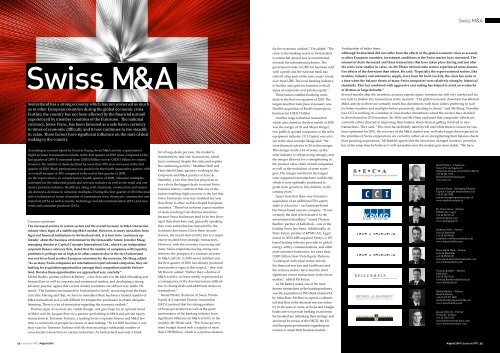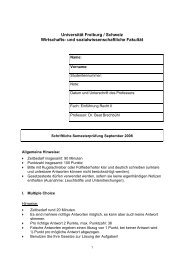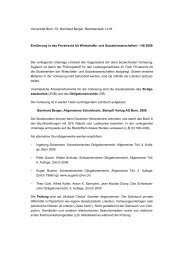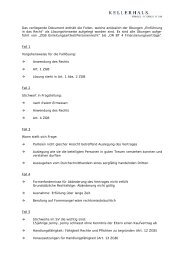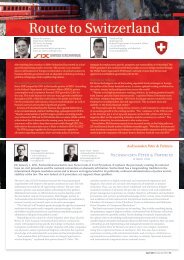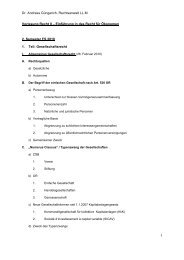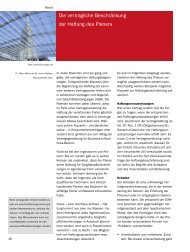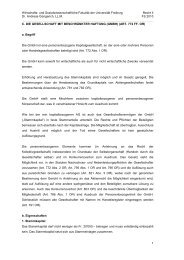Swiss M&A
Swiss M&A
Swiss M&A
You also want an ePaper? Increase the reach of your titles
YUMPU automatically turns print PDFs into web optimized ePapers that Google loves.
<strong>Swiss</strong> M&A<br />
Switzerland has a strong economy which has not worsened as much<br />
as in other European countries during the global economic crisis.<br />
Further, the country has not been affected by the financial turmoil<br />
experienced by member countries of the Eurozone. The national<br />
currency, <strong>Swiss</strong> Franc, has been favoured as a safe haven currency<br />
in times of economic difficulty and it now continues to rise steadily<br />
in value. These factors have significant influence on the state of deal<br />
making in the country.<br />
According to a recent report by Ernst & Young, <strong>Swiss</strong> M&A activity experienced a<br />
slight increase in transaction volume in the first quarter of 2010 when compared to the<br />
last quarter of 2009. It increased from USD10 billion to over USD11 billion in volume,<br />
however, the number of deals declined by more than 30% year-over-year in the first<br />
quarter of 2010. Stock performance was positive for the fourth consecutive quarter, with<br />
an overall increase of 40% compared to the end of first quarter of 2009.<br />
As the report shows, in comparison to fourth quarter of 2009, valuation multiples<br />
increased for the industrial goods and services industry as well as the retail and consumer<br />
products industry. Healthcare along with chemicals, construction and materials<br />
showed a decrease in valuation multiples. During the first quarter of 2010 the most<br />
active industries in terms of number of transactions were chemicals, construction and<br />
materials (23%) as well as media, technology and telecommunication (22%) and also<br />
retail and consumer products (21%).<br />
Cautious optimism<br />
The increased activity in certain sectors and the overall increase in M&A transaction<br />
volume show signs of a stabilising M&A market. However, as many specialists from<br />
legal and financial institutions in Switzerland said, it is best to be ‘cautiously optimistic’<br />
about the business environment in the foreseeable future. Jennifer Maag,<br />
managing director at Capital Concepts International Ltd., which is an independent<br />
corporate finance advisory firm, stated that the number of companies with liquidity<br />
problems is perhaps not as high as in other countries due to the fact Switzerland<br />
was not hit as hard as other European economies by the recession. Ms Maag added:<br />
“As so many <strong>Swiss</strong> companies are international export oriented companies, they are<br />
looking for acquisition opportunities amongst their competitors outside Switzerland.<br />
But also these opportunities are approached very carefully.”<br />
Michel Barbey, partner at Borel & Barbey - a law firm active in the field of banking and<br />
financial law as well as corporate and commercial matters, and developing a strong<br />
advisory practice, agrees that current market conditions are still not very stable. He<br />
noted: “The business environment in Switzerland is slowly recovering from the financial<br />
crisis. Having said that, we have to remember there has been a limited number of<br />
M&A transactions as it is still difficult for prospective purchasers to obtain adequate<br />
financing. There is a lot of uncertainty regarding the economic outlook.”<br />
Positive signs of recovery are visible though, and give hope for an upward trend<br />
in M&A activity. Jacques Bonvin, a partner specialising in M&A and private equity<br />
transactions at Tavernier Tschanz, a leading <strong>Swiss</strong> corporate finance and M&A law<br />
firm, is convinced of prosperous future of deal making: “So far 2010 has been a very<br />
busy year for Tavernier Tschanz with the firm securing a substantial number of<br />
cross-border transactions in various industries. As Switzerland sees only a hand-<br />
44 Corporate INTL August 2010<br />
ful of large deals per year, the market is<br />
dominated by mid-size transactions, which<br />
have continued despite the crisis and explain<br />
the continuing activity.” Matthias Wolf and<br />
Hans-Jakob Diem, partners working in the<br />
Corporate and M&A practice at Lenz &<br />
Staehelin, a law firm that has played an active<br />
role in the biggest deals in recent <strong>Swiss</strong><br />
business history, confirmed that one of the<br />
factors enabling slight recovery is the fact that<br />
<strong>Swiss</strong> businesses were less troubled last year<br />
than those in other well developed European<br />
countries. “There has not been a great number<br />
of deals resulting from distress situations<br />
because <strong>Swiss</strong> businesses tend to be less leveraged<br />
than elsewhere and, generally speaking,<br />
they were somewhat less impacted by the<br />
economic downturn. Given these circumstances,<br />
the recent deal activity has to a major<br />
extent resulted from strategic transactions.<br />
However, with the economy recovering and<br />
many <strong>Swiss</strong> corporates having strong cash<br />
reserves, the prospect of a cautious increase<br />
in M&A activity in 2010 seems justified and<br />
the first quarter of 2010 has already produced<br />
some positive signs in this respect,” they said.<br />
Mr Bonvin added: “Rather than a decline of<br />
M&A activity, we have mostly experienced as<br />
a consequence of the downturn more difficulties<br />
in closing deals and additional delays in<br />
transactions.”<br />
Bernd Pfister, chairman of <strong>Swiss</strong> Private<br />
Equity & Corporate Finance Association<br />
(SECA) noticed that the strong position<br />
of <strong>Swiss</strong> government as well as the good<br />
performance of the banking industry have<br />
significant influence on M&A activity in the<br />
country. Mr Pfister said: “The <strong>Swiss</strong> government<br />
budget closed with a surplus of more<br />
than CHF2billion, which is a positive element<br />
for the economic outlook.” He added: “The<br />
crisis in the banking sector in Switzerland<br />
is somewhat special and is concentrated<br />
towards the international players. The<br />
government stake in UBS AG has been sold<br />
with a profit and the national bank has<br />
sold off a big junk of the toxic assets it took<br />
over from UBS. The local banking industry<br />
is healthy and open for business with all<br />
types of corporates and private equity.”<br />
These factors enabled finalising some<br />
deals in the first two quarters of 2010. The<br />
largest deal that took place in January was<br />
Nestlé’s acquisition of Kraft’s frozen pizza<br />
business for USD3.7 billion.<br />
Another large industrial transaction<br />
which also closed in the first month of 2010<br />
was the merger of 3S and Meyer Burger,<br />
two publicly quoted companies in the solar<br />
equipment industry. CCI Capital was advisor<br />
to the deal. Jennifer Maag said: “We<br />
were financial advisor to 3S in this merger.<br />
This merger made a lot of sense, as the<br />
solar industry is still growing strongly, and<br />
the merger allowed for a strengthening in<br />
the product value chain of both companies<br />
as well as the realisation of some synergies.<br />
The merger resulted in the largest<br />
solar equipment manufacturer worldwide,<br />
which is now optimally positioned to<br />
profit from growth in this industry in the<br />
coming years.”<br />
Apart from that there was Novartis’s<br />
acquisition of an additional 52% equity<br />
stake in Alcon Inc – an American-listed<br />
but <strong>Swiss</strong>-based eyecare company. “It was<br />
certainly the deal which made it to the<br />
international headlines,” stated Thomas<br />
Baehler, partner at Kellerhals – one of the<br />
leading <strong>Swiss</strong> law firms. Additionally, as<br />
Peter Fatzer, partner at KPMG AG, Legal<br />
noted, in 2010 ABB acquired Ventyx, a US<br />
based leading software provider to global<br />
energy, utility, communications, and other<br />
asset-intensive businesses, for more than<br />
USD1 billion from Vista Equity Partners.<br />
“Looking at individual sector activity,<br />
the financial services and healthcare and<br />
life sciences sectors have seen the most<br />
significant recent transactions in the <strong>Swiss</strong><br />
market,” added Mr Fatzer.<br />
As Mr Barbey noted, one of the most<br />
known transactions in the banking industry<br />
was the acquisition of ING Bank (Suisse) SA<br />
by Julius Baer. Mr Bonvin expects a substantial<br />
deal flow in the financial services industry<br />
in the years to come, as <strong>Swiss</strong> and foreign<br />
banks active in private banking in and from<br />
Switzerland are rethinking their strategy and<br />
are forced by moves of the OECD, the US<br />
and European governments regarding tax<br />
evasion to adapt their business models.<br />
<strong>Swiss</strong> M&A<br />
Anticipation of better times<br />
Although Switzerland did not suffer from the effects of the global economic crisis as severely<br />
as other European countries, investment conditions at the <strong>Swiss</strong> market have worsened. The<br />
amount of deals decreased and those transactions that have taken place during and just after<br />
the crisis were smaller in value. As Mr Pfister noticed some sectors experienced more destructive<br />
effects of the downturn than others. He said: “Especially the export oriented sectors, like<br />
machine industry and automotive supply, have been hit hard. Luckily, the crisis has come at<br />
a time when the balance sheets of many <strong>Swiss</strong> companies were relatively strong by historical<br />
standards. This fact combined with aggressive cost cutting has helped to avoid an avalanche<br />
of distress or large defaults.”<br />
Several months after the recession, as many experts agree, investors are still very careful and do<br />
not rush to finalise any transactions at the moment. “The global economic downturn has affected<br />
M&A activity as there are certainly much less divestitures with more sellers preferring to wait<br />
for better numbers and multiples before proactively deciding to divest,” said Ms Maag. Nonetheless,<br />
CCI is working on a number of cross-border divestitures where the owners have decided<br />
to divest based on 2010 numbers. Mr Wolf and Mr Diem explained that companies’ efforts are<br />
currently rather directed at improving their balance sheets than at getting involved in new<br />
transactions. They said: “The crisis has definitely taken its toll and while there is reason for cautious<br />
optimism for 2010, the recovery of the M&A market may well take longer than expected as<br />
the priorities of <strong>Swiss</strong> corporations are currently rather set on strengthening their balance sheets<br />
than pursuing acquisitions.”Mr Baehler agrees that the slowdown changed investors’ priorities<br />
but at the same time he believes it will normalise once the market gets more stable. “We have<br />
Bernd Pfister – Chairman<br />
<strong>Swiss</strong> Private Equity &<br />
Corporate Finance Association (SECA)<br />
+41 44 421 3174<br />
Bernd.Pfister@mmmag.ch<br />
www.seca.ch<br />
Jennifer Maag – Managing Director<br />
Capital Concepts International Ltd<br />
+41 43 266 7080<br />
jennifer.maag@capitalconcepts.ch<br />
www.capitalconcepts.ch<br />
Dr. Peter Fatzer - Partner<br />
KPMG AG, Legal<br />
+41 44 249 28 44<br />
pfatzer@kpmg.com<br />
www.kpmglegal.ch<br />
Matthias Wolf – Partner<br />
Lenz & Staehelin<br />
+41 58 450 80 00<br />
matthias.wolf@lenzstaehelin.com<br />
www.lenzstaehelin.com<br />
Hans-Jakob Diem - Partner<br />
Lenz & Staehelin<br />
+41 58 450 80 00<br />
hans-jakob.diem@lenzstaehelin.com<br />
www.lenzstaehelin.com<br />
Thomas Baehler – Partner<br />
Kellerhals<br />
+41 58 200 35 00<br />
Thomas.Baehler@kellerhals.ch<br />
www.kellerhals.ch<br />
Michel Barbey – Partner<br />
Borel & Barbey<br />
+41 (0) 22 707 1800<br />
michel.barbey@borel-barbey.ch<br />
www.borel-barbey.com<br />
Jacques Bonvin - Partner<br />
Tavernier Tschanz<br />
+41 22 704 37 00<br />
bonvin@taverniertschanz.com<br />
www.taverniertschanz.com<br />
August 2010 Corporate INTL 45
<strong>Swiss</strong> M&A<br />
experienced a fundamental shift in the way<br />
private equity firms are operating in light of<br />
a still difficult debt financing environment.<br />
As a consequence, buyout activities have<br />
been in a sharp decline recently. From my<br />
own experience as both an M&A lawyer<br />
and a member of the board of an array of<br />
export-oriented industrial corporations,<br />
I am positive that market confidence will<br />
return during 2010, albeit in a somewhat<br />
slow and unsteady way,” he said.<br />
The economic slowdown caused the inability<br />
of prospective acquirers to finance<br />
acquisitions and as a consequence this has<br />
indeed affected M&A activity. Troubles in<br />
the financial sector made it hard for private<br />
equity to obtain financing at competitive<br />
terms and conditions. However, as Mr<br />
Barbey claimed, obtaining financing depends<br />
on the volume of transactions. “For<br />
limited recourse financing or financing for<br />
amounts of less than CHF20 millions, it is<br />
not too complicated to obtain financing at<br />
competitive terms and conditions but for<br />
higher amounts, it is still difficult to find<br />
institutions in Switzerland that are willing<br />
to finance such private equity investment,”<br />
he said. Mr Bonvin relayed a slightly different<br />
experience: “The lending activity<br />
specifically within Switzerland has not<br />
diminished as much as expected and banks,<br />
notably the two main <strong>Swiss</strong> banks, UBS<br />
and Credit Suisse, that are to restore some<br />
of their reputation lost during the crisis,<br />
have continued financing deals reasonably<br />
leveraged. In a number of transactions,<br />
our clients were even able to secure better<br />
terms than those they would have obtained<br />
in 2007, with strong competition amongst<br />
financing banks.”<br />
Mr Baehler also noticed there can be good<br />
sides of the situation. He commented: “The<br />
main impact of the financial crisis is obvious:<br />
cash is king. Banks are still cautious to<br />
finance transactions by ways of credit. As<br />
a consequence, deals are much more likely<br />
to be strategic in nature. Yet, this may very<br />
well translate into a competitive edge for<br />
investors as such deals are apt to deliver<br />
more sustainable results in the long run.”<br />
The global economic crisis caused change<br />
not only in the amount and value of deals<br />
but it also had influence on the type of<br />
acquirers in Switzerland. According to<br />
Mr Fatzer there is an increasing trend of<br />
the last few years for <strong>Swiss</strong> targets to be<br />
acquired by domestic rather than foreign<br />
buyers. As Mr Barbey explained there are<br />
two reasons for it: firstly, the <strong>Swiss</strong> Franc is<br />
a strong currency and secondly, <strong>Swiss</strong> companies<br />
rather perform well in the financial<br />
crisis and they are not that cheap to buy.<br />
46 Corporate INTL August 2010<br />
“However, in our practice we have seen a<br />
growing interest from Indian companies<br />
to acquire <strong>Swiss</strong> targets in all sectors or<br />
to establish business in Switzerland,” he<br />
added. Ms Maag confirmed that Asian<br />
buyers are willing to invest in Switzerland.<br />
She said: “Chinese and Indian buyers are<br />
showing high interest across many different<br />
sectors, from banking to industrial<br />
companies. Two good examples of this are<br />
Hindustan Construction Company’s stake<br />
in Karl Steiner AG (construction) as well as<br />
Hinduja Bank’s acquisition of Banca Commerciale<br />
di Lugano.”<br />
National legislation and challenges for<br />
investors<br />
Regardless of the economic conditions,<br />
foreign investors can be interested in<br />
<strong>Swiss</strong> targets as the national legislation is<br />
favourable for inbound transactions (foreign<br />
acquirers buying <strong>Swiss</strong> businesses).<br />
“As an archetype of an SOE – a small open<br />
economy – Switzerland’s legislation has<br />
traditionally been very favorable to foreign<br />
investors. The bilateral treaties with<br />
the European Union have only added to<br />
this already considerable degree of openness,”<br />
noted Mr Baehler.<br />
As Mr Wolf explained, corporate tax plays<br />
an important role in attracting foreign<br />
buyers. “The tax regime is attractive with<br />
comparatively low corporate tax rates,<br />
flexible reorganisation exemptions, a good<br />
treaty network, tax relief for participation<br />
income and attractive holding and domiciliary<br />
company regimes and political efforts<br />
are underway to maintain and strengthen<br />
the competitiveness of the corporate tax<br />
regime,” he said.<br />
Further, the national legislation enables<br />
many diverse types of deals. “Switzerland<br />
has a very flexible contract law that allows<br />
a wide variety of transactions, from a simple<br />
share deal to very complex multi-jurisdiction<br />
asset deal with an earn-out model.<br />
Switzerland has also recently introduced<br />
new company types, for example the limited<br />
partnership for collective investments.<br />
Tailor-made investment and/or shareholders<br />
agreements are available which should<br />
meet the main requirements of all parties<br />
in most deals, which compensates for the<br />
minor deficiencies of <strong>Swiss</strong> corporate law<br />
(for example regarding redemption or conversion<br />
of shares),” said Mr Fatzer.<br />
He added that national institutions<br />
regulating the <strong>Swiss</strong> business such as the<br />
tax authorities, competition commission,<br />
takeover board and commercial registers<br />
“generally have a business oriented approach<br />
and tend to respond to enquiries in<br />
a timely manner.”<br />
Mr Diem stated that there are only few<br />
hurdles in <strong>Swiss</strong> regulations regarding foreign<br />
investment. “Switzerland has relatively<br />
few restrictions on foreign ownership, such<br />
restrictions concerning primarily the acquisition<br />
of <strong>Swiss</strong> residential real estate and<br />
the acquisition of businesses in regulated<br />
industries such as banking, securities trading,<br />
and insurance. Restrictions on foreign<br />
investment may also apply in the telecommunications<br />
and media industry as well as<br />
in aviation, maritime shipping, and power<br />
generation,” he noted.<br />
Although the national legislation is<br />
favourable to foreign investors looking to do<br />
transactions in Switzerland, there are also<br />
some limitations. According to Mr Barbey,<br />
one of the biggest recent challenges for large<br />
transactions in Switzerland would be to<br />
overcome the <strong>Swiss</strong> antitrust law provisions.<br />
“Indeed, this year, the antitrust commission<br />
vetoed the acquisition of Sunrise by Orange<br />
(telecom companies) as it would constitute<br />
an abuse of a dominant position. This is<br />
really the first time that the <strong>Swiss</strong> antitrust<br />
commission has vetoed such a transaction as<br />
it had authorized in the past transactions of a<br />
similar size in terms of dominant position on<br />
a specific market,” he commented.<br />
“Systematically also, whenever acquisitions<br />
have recently taken place, one of the<br />
key legal issues to address is the degree of<br />
coverage of any pension plan of the <strong>Swiss</strong><br />
acquired company and whatever financial<br />
steps were taken to recapitalize such pension<br />
plan,” added Mr Barbey.<br />
Another challenge associated with acquiring<br />
a business in Switzerland is related to<br />
bridging price expectations and aligning<br />
interests of buyers and sellers. Mr Fatzer<br />
noted: “We have seen an increasing number<br />
of purchase price adjustment mechanisms<br />
and earn-out models in recent transactions.<br />
Such models often lead to discussions and<br />
even claims if provisions and definitions in<br />
the sale and purchase agreements are in any<br />
way ambiguous.”<br />
He also emphasized the fact that nowadays<br />
more and more transactions are carried<br />
out on international scale, which brings<br />
more complexities. “The legal challenge for<br />
buyers is to efficiently cover complex multiple-jurisdiction<br />
transactions. In one of our<br />
latest transactions the target was a <strong>Swiss</strong><br />
based company listed on a stock exchange<br />
in the EU with several subsidiaries spread<br />
over Europe. To fully cover all legal aspects<br />
of this transaction (corporate, contract and<br />
employment laws in various jurisdictions,<br />
foreign stock exchange requirements and<br />
merger control issues in Switzerland and<br />
several European countries) we teamed up with our<br />
legal colleagues from other KPMG member firms<br />
and to offer the buyer a one-stop-shop which fully<br />
covered all legal aspects of this multiple jurisdiction<br />
transaction,” said Mr Fatzer.<br />
Extra carefulness<br />
Unstable market conditions and thus investors’<br />
uncertainty are closely linked with their willingness<br />
to carefully analyse every business before<br />
possible transaction. Therefore, investors set<br />
much store by due diligence. Ms Maag noted there<br />
is a greater emphasis on “internal” or “market”<br />
due diligence as compared to two years ago. She<br />
noted: “The main question for any acquirer is to<br />
assess the impact of the economic downturn on the<br />
target’s figures. Everyone wants to make sure that<br />
‘the worst is over’ before they make the acquisition,<br />
and so they spend a lot of time understanding<br />
the numbers, backlog, order patterns, and other<br />
trends. However, this analysis is something that<br />
many clients have taken ‘in –house’, preferring not<br />
to rely only on advisor to stress-test budgets and<br />
projections.”<br />
Mr Wolf confirmed that investors are now more careful<br />
when it comes to new deals. “Buyers take their<br />
time to evaluate transactions. In the financial services<br />
area, the due diligence is in particular looking to identify<br />
unwelcome assets like bad loans or CDOs. Also,<br />
we have witnessed an increased focus on due diligence<br />
by lenders of acquisition financings,” he said.<br />
Mr Fatzer commented that investors also look at<br />
factors such as earnings, budgets or working capital<br />
before the full scope due diligence will take place.<br />
“A trend that has become more and more common<br />
in buy-side transactions during the crisis is a clear<br />
concentration on the drivers of value and price (for<br />
instance underlying earnings, budgets and projections,<br />
net debt, working capital) at the very beginning<br />
of a transaction before full scope due diligence<br />
is undertaken. To a certain extent this reflects buyers’<br />
suspicions about the quality of projections and<br />
their increased risk awareness as well as pressure on<br />
deal teams to spend the available funds with utmost<br />
caution and only if they feel that the risks can be<br />
managed appropriately to a very high degree,” he<br />
noted. “As funding became more expensive, sellers<br />
are well advised to perform their own due diligence<br />
on the financing capabilities of potential buyers,”<br />
added Mr Fatzer.<br />
Outlook for the future<br />
After hard financially time of 2009, the <strong>Swiss</strong> market<br />
experienced in the first two quarters of 2010 a small<br />
recovery with a slight increase of M&A activity. If<br />
the tendency stays on the same level it is likely that<br />
the investor confidence will grow and thus M&A<br />
activity will get back to the level it was at in 2008.<br />
The overall economic situation in Switzerland continued<br />
to stabilise during the last quarter of 2009 and the<br />
stock market recovered significantly but the outlook<br />
for M&A activity for the full year 2010 remains cau-<br />
<strong>Swiss</strong> M&A<br />
“Given that the <strong>Swiss</strong> economy is weathering<br />
off the crisis fairly well and that the <strong>Swiss</strong><br />
businesses are relatively cash-rich, we are<br />
cautiously optimistic for an increase in M&A<br />
activity in 2010 and 2011.”<br />
tiously optimistic.<br />
Although debt financing becomes more readily available, the general conditions<br />
to receive bank financing for M&A transactions remain tough. As a consequence,<br />
private equity firms are expected to continue focusing on operational improvements<br />
instead of increasing financial leverage in M&A transactions. The rise in<br />
stock market valuations also increases the probability of public exits for investments<br />
of private equity funds, hence IPOs might become an attractive alternative<br />
to generate cash again, according to the recent report by Ernst & Young. However,<br />
trade sales and secondary market transactions are still expected to be preferred by<br />
private equity firms in the forthcoming months. Therefore, deal activity from PE<br />
houses is forecast to stabilise or increase slightly during the upcoming quarters.<br />
Mr Fatzer believes that there are some positive indicators of recovery in M&A<br />
activity in the foreseeable future. He said: “For the moment it looks like the market<br />
will continue to be dominated by strategic buyers with cash on hand until the debt<br />
markets open up again to let in private equity investors. Our recent conversations<br />
with both strategic and financial buyers confirm that targets are continuously being<br />
identified and monitored, allowing these investors to move quickly when market<br />
conditions improve.”<br />
Mr Wolf and Mr Diem also noticed some positive signs for more dynamic M&A<br />
activity. “Given that the <strong>Swiss</strong> economy is weathering off the crisis fairly well and<br />
that the <strong>Swiss</strong> businesses are relatively cash-rich, we are cautiously optimistic for an<br />
increase in M&A activity in 2010 and 2011,” they said.<br />
Overall, it is fair to say that <strong>Swiss</strong> firms were considerably less exposed to the<br />
risks of the global downturn that most of their competitors in Europe and Northern<br />
America, noticed Mr Baehler. He continued: “Yet, the <strong>Swiss</strong> Private Banking sector<br />
is likely to face unprecedented challenges in the coming months and years forcing<br />
many of the traditional private banking institutions to thoroughly reevaluate their<br />
business model. As a result, not only the healthcare and life sciences but also financial<br />
sector are all likely to be the driving forces in 2010 M&A market.”<br />
According to Mr Baehler there are two important trends in the current market.<br />
“Firstly, the ‘pipeline is full’ as far as the mid-market is concerned. Many vendors<br />
have been delaying a sale expecting an upwards move regarding valuations. The<br />
effect of the full pipeline is likely to kick in during the next few months when the<br />
recovery of the market is gaining ground. We are, thus, confident that we will experience<br />
a considerable rise in midmarket transaction later this year. Secondly, the<br />
strength of the <strong>Swiss</strong> Franc towards both the Euro and the Dollar adds more buying<br />
power to the cash. We might not yet become the ‘The Red Hot Center of M&A’<br />
as which the <strong>Swiss</strong> market was dubbed by the Wall Street Journal’s Deal Journal in<br />
2008, but I am pretty sure we’re slowly getting somewhere close to what we’ve seen<br />
two years ago,” he said.<br />
However, as Ms Maag noticed it will take quite a while for the market to recover.<br />
She noted:<br />
“We feel that the second half of 2010 will see a slight increase of M&A compared<br />
to the first half of 2010, but a real increase in larger transactions can be expected not<br />
earlier than 2011.”<br />
August 2010 Corporate INTL 47


